










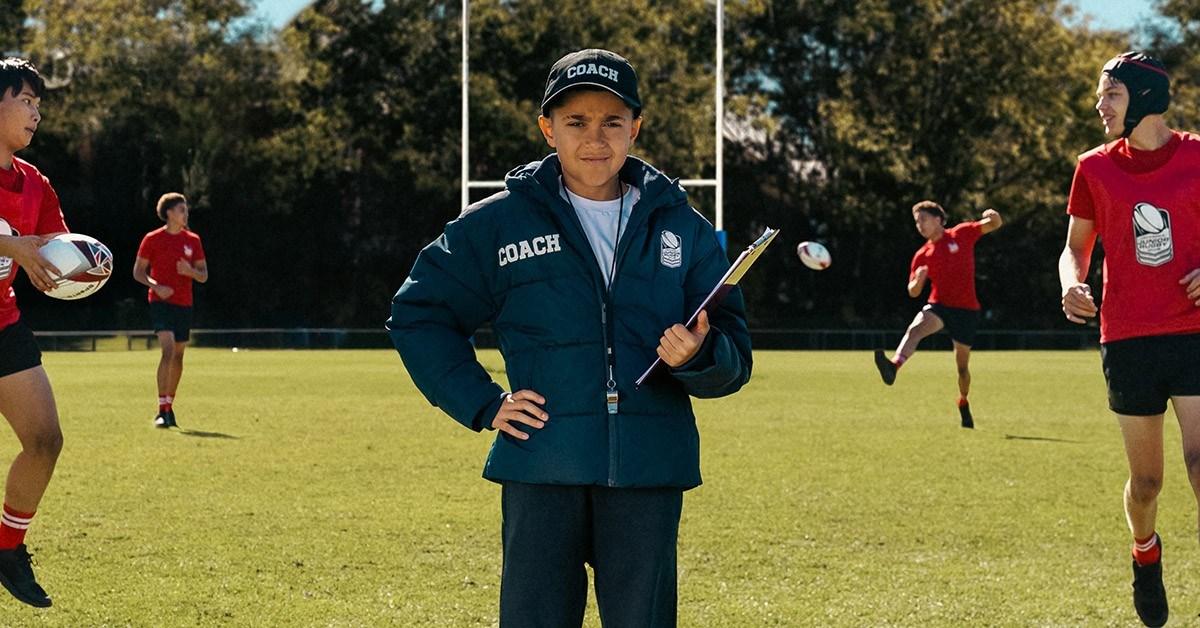

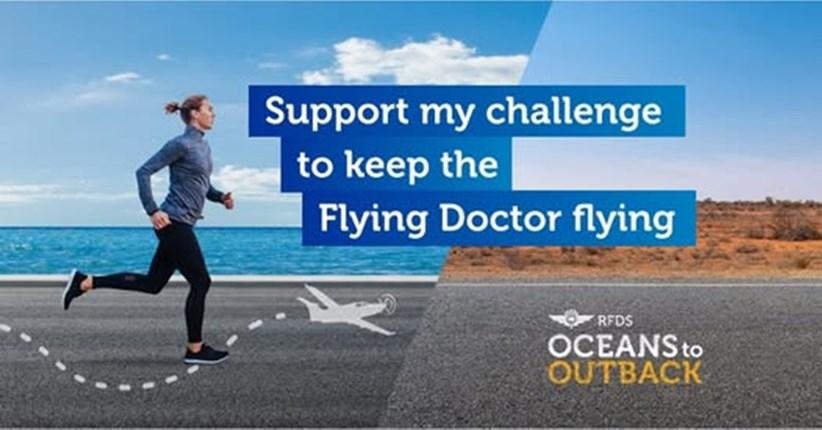

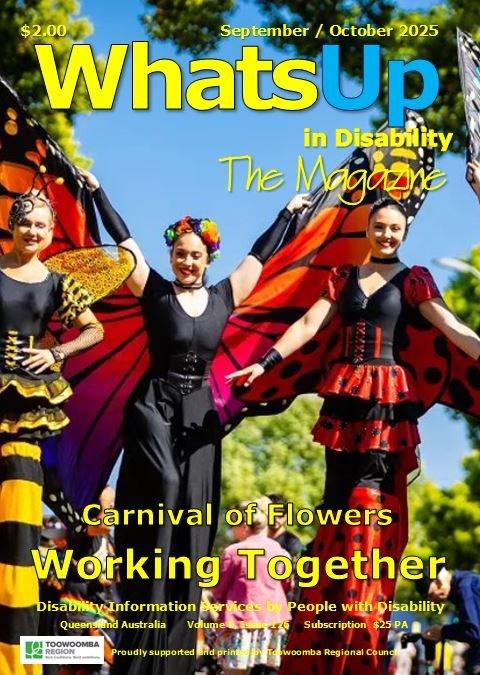
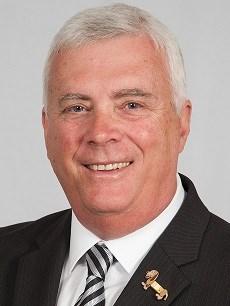


















Capped prices set by the NDIA were initially introduced to help encourage providers to enter the market while ensuring value for money for participants and the Scheme. They were never intended to be a long-term market strategy. Originally, prices were intended to be set at a level reflecting an efficient cost of delivery. When these failed to attract enough providers to meet demand, the NDIA increased prices, especially for therapies, in the 2019-20 Price Guide. This was intended to bring them in line with the higher end of pricing observed in other care and private sector markets. Conveniently, the report omits the fact that the pricing strategy has clearly done a 180 since then, as this was the last time that most therapy prices were increased at all.
The idea was that as the NDIS market matured, providers would naturally begin to differentiate on price and caps would no longer be necessary. The report makes a few suggestions as to why this vision hasn’t eventuated:
• Demand often outstrips supply, so providers have no incentive to reduce their prices
• Pricing is often less important to participants than other factors (eg. proximity, rapport and reliability) when choosing providers
• People have more immediate priorities than shopping around for lower priced services
• Participant budgets are calculated us-
ing the price caps so people are fully funded to buy all their required services at the price cap
10 years into this pricing approach and the pricing cap has effectively become a de-facto price, at least for plan managed and agency managed funds. It’s a blunt instrument that remunerates all providers at the same rate, regardless of the quality or complexity of service or organisational structure. This has led to a situation where some providers, like sole trader support workers, may be getting paid well above what it costs them to deliver services. While other established providers delivering more complex services have no financial incentive (or means) to specialise, invest in clinical governance, supervision or develop and train junior staff.
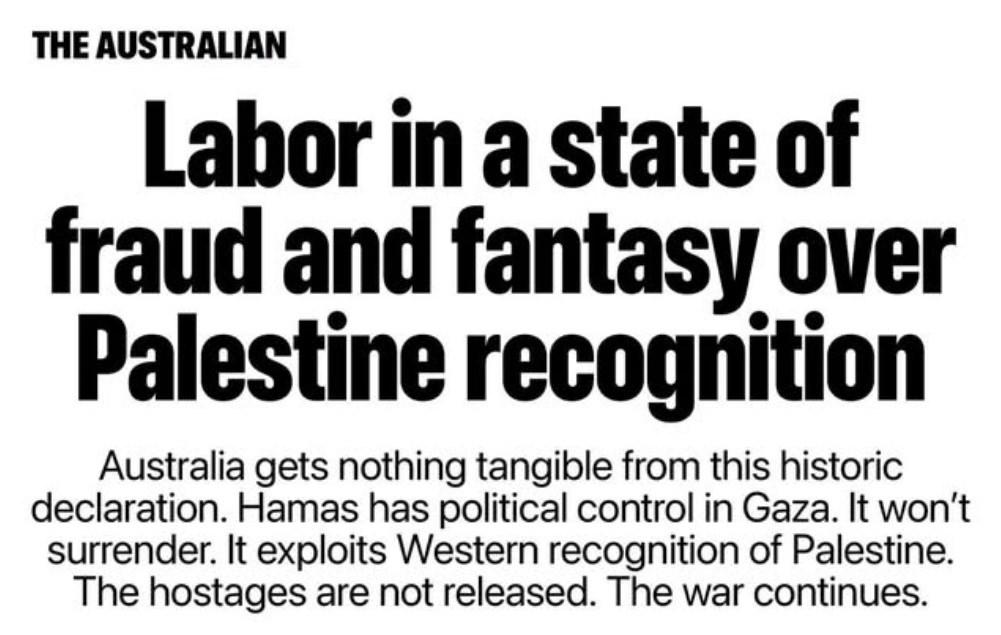
Thank you The Australian newspaper for saying it as it is. I and others have serious concerns about the Albanese Government’s decision to unilaterally recognise a Palestine State outside of a proper peace and two state process.
Steven Paull
WhatsUp in Disability
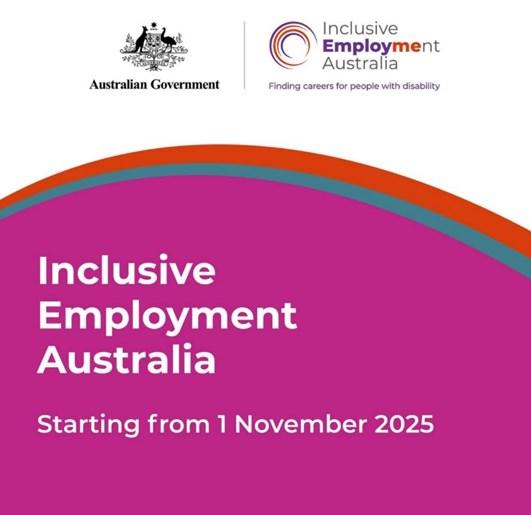
Inclusive Employment Australia is a new specialist disability employment program launching in November 2025, replacing the current Disability Employment Services (DES). This program aims to create a more inclusive workforce by providing tailored support to individuals
with disabilities, injuries, or health conditions, helping them prepare for, find, and maintain meaningful employment. The program focuses on individual strengths and needs, offering flexible support and removing barriers to employment.
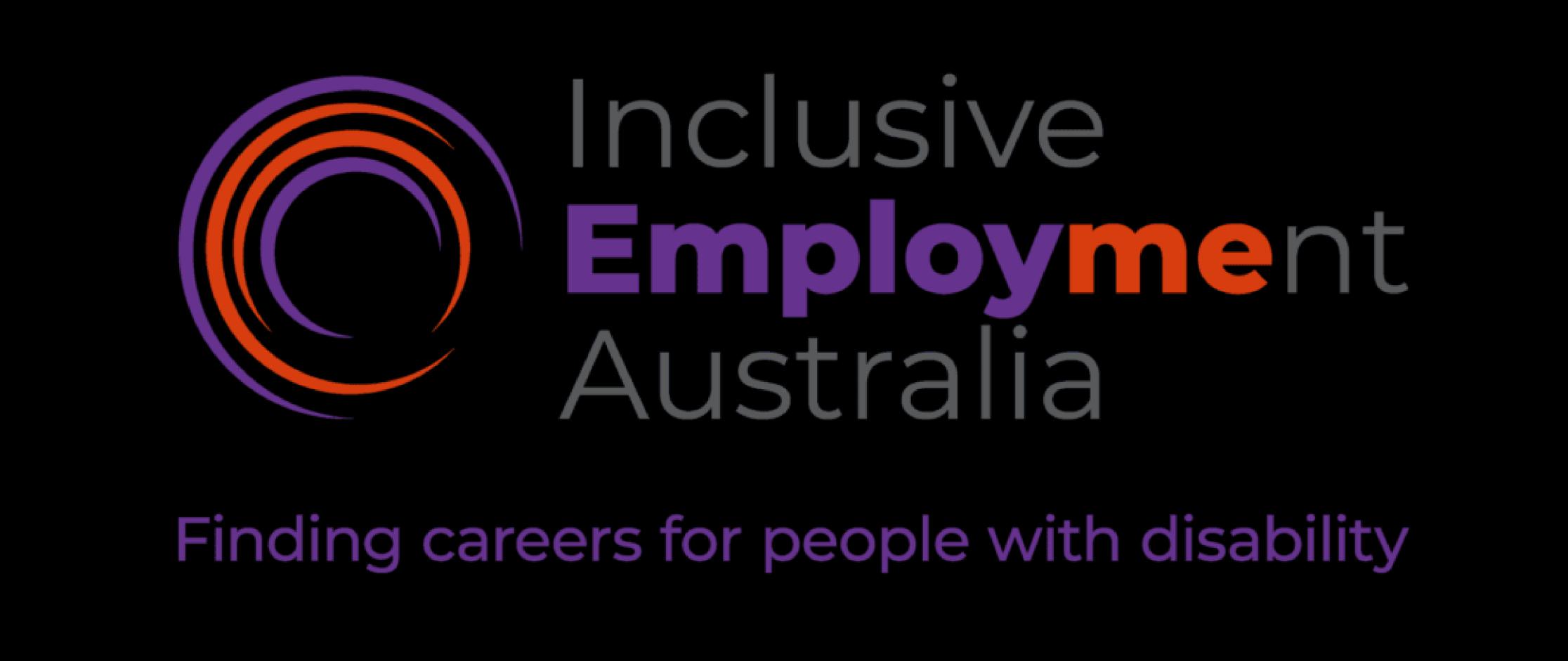
tices, ensuring that people with disabilities have opportunities to thrive in the workplace.
The program will be open to more job seekers, including those with assessed work capacity of less than 8 hours per week and voluntary participants not receiving a Centrelink income support payment.
There will no longer be a two-year limit on the duration of support for participants.
The program aims to simplify and improve services for job seekers, employers, and service providers.
The program will provide more accessible and participant-focused support to help individuals with disabilities find and maintain employment.
It will create more opportunities for people with disabilities to participate in the workforce.
The program will support individuals in advancing their careers and achieving
pool of skilled and diverse candidates.
The program will provide resources and support to help employers create more inclusive workplaces.
Inclusive workplaces often lead to increased productivity, innovation, and a more positive work environment.
In essence, Inclusive Employment Australia is a significant step towards creating a more equitable and inclusive workforce in Australia, where people with disabilities have the same opportunities to participate and thrive as everyone else.
There are 83 Inclusive Employment Australia providers available at the following link:
https://www.dss.gov.au/disabilityemployment-reforms/notice-aboutinclusive-employment-australia-andnational-panel-assessors-programs

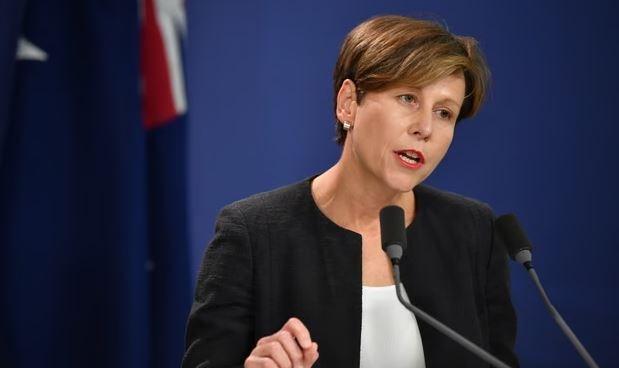
Australian children are flocking to the NDIS, with 16% of all 6-year-old boys in the country now relying on it, as the government begins designing a new pathway to help families leave the rapidly growing $46 billion program.
NDIS Minister Jenny McAllister said further reforms were still needed to make the scheme sustainable, as fresh data shows more than one in 10 children aged five to seven in Australia are participants: 13.7% of boys and 6.4% of girls.
The figures are revealed in the latest quarterly report from the NDIA, which discloses that about 80,000 people joined the NDIS in the last 12 months, taking total scheme numbers to almost 740,000 people.
The data is further proof that the
scheme continues to be a lifeline for struggling children, with families seeking NDIS support for their children’s developmental delays or autism because it remains too difficult to get help outside of it.
But even as the number of participants grew, the scheme came in under budget forecasts for the 2024-25 financial year, as the rising cost of the NDIS comes into focus for the Albanese government before its economic roundtable next week.
Quarterly figures show that scheme costs grew by 10.8% last financial year, lower than the projected growth rate of 12%, which meant its $46.3 billion cost to the federal budget was $520 million below predictions.
The scheme is still one of the budget’s biggest pressures, and its third-largest expense. The latest figures suggest it is on track to reach an 8% growth target set for mid next year, but that number will still put substantial pressure on the budget bottom line.
McAllister, who took on the portfolio after the May election, said there was data in the report that showed the NDIS was delivering more high-quality support.
More than 80% of participants aged 15 and older said they had greater choice and control in their lives, up from 67%, while the number of 15 to 24-year-old participants in work doubled.
“But as the Independent NDIS Review [from 2023] found, the NDIS needs a
broader ecosystem of disability supports outside the scheme to make sure it is sustainable,” she said.
“Scheme growth is declining. That’s good news. We are getting closer towards the 8% target, but we know there is more work to be done.”
Key to the reforms is a funding deal with the states and territories that will establish a new system of “foundational supports” that can help people with less intense needs still access disability support.
Children are a particular focus area of the changes, which were supposed to start on 1 July 2025 but have been deferred until the end of the year as negotiations continue between federal and state governments.
The number of children joining the scheme each month continues to be one of its greatest pressure points. The proportion of all five to seven-year-old children on the NDIS grew from 10% to 10.2% in just three months to June 2025. The proportion of 6 year-old boys – who have the highest participation rate of all demographics – grew from 15% to 16%, or just more than one in six.
Prime Minister Anthony Albanese, when asked in July whether he was happy with the number of young children on the scheme, said: “No, I’m not.”
“We need to make sure that it is made more sustainable,” he said at a Sky News forum. “We are working through the reform issues as well, with state and territory governments.
“Certainly, the vision of the NDIS wasn’t
that those sort of numbers quoted go on the system.”
But he said it was important that reform be worked through carefully, “because it’s very easy for vulnerable people to feel like their support is threatened”.
“We don’t want that. People who need the NDIS need to keep it, but also there were massive rorts in the system. That’s the truth,” Albanese said.
The latest scheme report said the agency had started work to design an early intervention pathway for children under nine years old who have developmental delays or disabilities.
“A high-level concept has been developed that covers major stages of the pathway experience, including connecting with the NDIS; applying for access; assessment of support needs; the budget setting and planning process; [and] implementing a plan and engaging services,” the report said.
It is also seeking to improve how progress towards early intervention outcomes is monitored, and to help children transition out of the NDIS if they do not need long-term support.
There has also been an increase in older children’s participation, which poses a challenge for the Albanese government’s attempts to control the scheme’s growth because it shows families are continuing to seek NDIS support even after early intervention pathways end when a child turns nine.
The agency said it was co-designing changes to the scheme with parents and carers who had lived experience, as well as a children’s expert advisory group, which was providing advice on best practice.
Does your business or organisation work with children, or provide services or spaces for them? If so, you need to be getting ready for Queensland’s new child safeguarding law (the Child Safe Organisation Act 2024) which comes into effect from 1 October 2025.
The 10 Child Safe Standards are one of two components of Queensland’s Child Safe Organisation system and must be implemented by businesses or organisations working with or providing spaces and facilities for anyone aged 17 years and under.
Around 40,000 organisations will need to show they are child safe through meeting these Standards. This includes small volunteer and community groups and sole traders, through to large and wellestablished organisations, such as hospitals, schools and churches.
In implementing the 10 Standards, you’ll also need to consider the Universal Principle. This is part of the Act and is about creating culturally safe environments for Aboriginal and Torres Strait Islander children and their families, which broadly means they feel welcome, safe, valued, included and respected. An organisation that is culturally safe is child safe.
The actions you will need to take to implement the Standards and the Universal Principle will depend on your sector, the size and scale of your organisation, and the kind of work you do with children. There is no one-size-fits-all approach, and your implementation will depend on your circumstances.
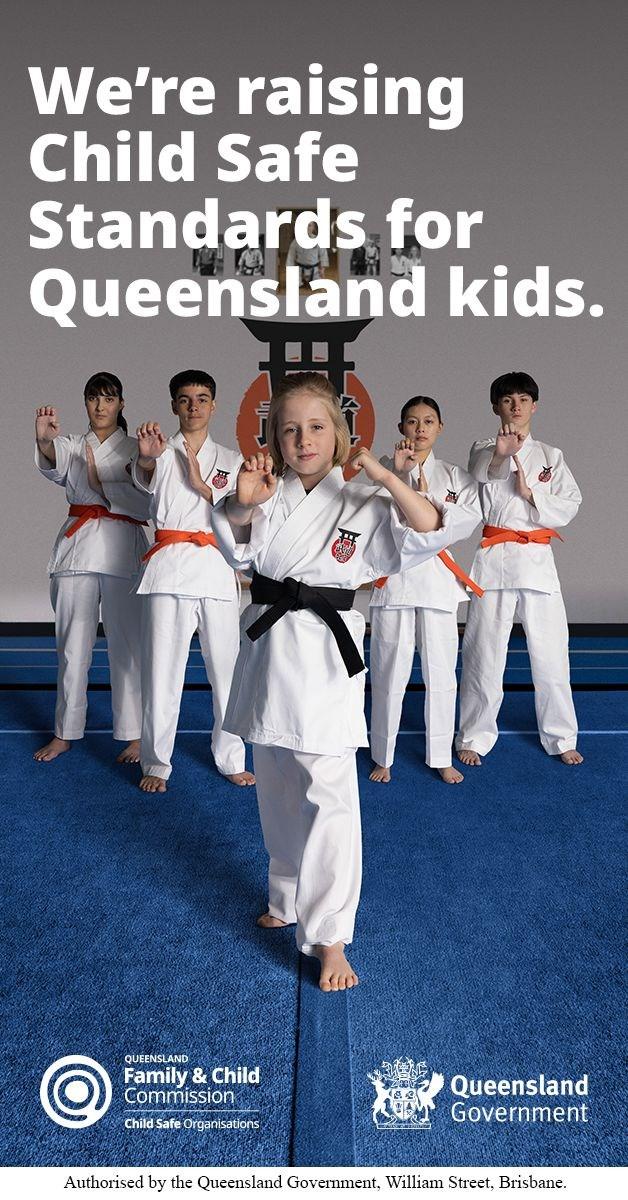

Child safety and wellbeing is embedded in the entity’s organisational leadership, governance and culture. Every organisation should be a model of children’s safety and wellbeing. Leaders set the tone and example by embedding children’s safety and wellbeing into policies, procedures and culture and ensuring these are followed and reviewed. Leaders also ensure there is a healthy reporting culture and they support people to report concerns, take reports seriously and act to investigate and make improvements to ensure children’s safety and wellbeing is protected.
The aim is to create an environment where everyone in the organisation understands their role and responsibilities to protect children, and that they act accordingly. All members of an organisation are accountable for providing a safe environment for every child.

Children are informed about their rights, participate in decisions affecting them and are taken seriously.
Creating spaces where children are knowledgeable about their rights and confident in their ability to express concerns, provide input, and participate in meaningful ways is an important aspect of being child safe.
The adults who support children in your organisation need to understand and respect children’s agency and take steps to ensure they are treated as competent and capable. This means adults tailor their approach based on the age, developmental stage, culture and any other specific needs of the child. Decisionmaking processes should centre on the perspectives of children and demonstrate genuine respect for their views.
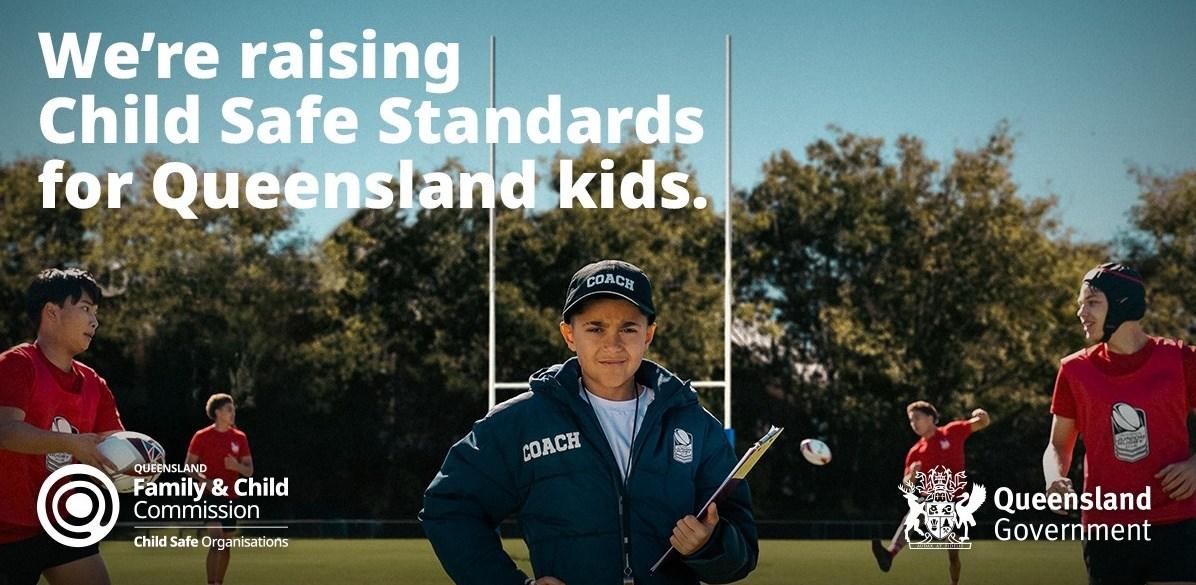

Families and communities are informed and involved in promoting child safety and wellbeing.
Child safety and wellbeing are strengthened when families and communities are informed, engaged and are active partners in promoting safe environments. Organisations should foster strong, transparent relationships with families and communities as valued contributors to the shared responsibility of protecting children. Open communication, trust and mutual respect are the foundation for collaborative and inclusive child-safe practices.

Equity is upheld and diverse needs respected in policy and practice.
Upholding equity and diversity helps build environments where every child feels valued, respected, supported and culturally safe. Equity should be reflected in every policy, decision and action, to ensure that all children have fair access to a safe, nurturing environment and healthy future. Equity requires that the unique needs of every child are met. This includes children from culturally and linguistically diverse communities, children who are refugees or asylum seekers, children with disability and children who identify as LGBTIQA+.

People working with children are suitable and supported to reflect child safety and wellbeing values in practice.
The suitability and capability of staff and volunteers is pivotal to creating safe environments for children. Organisations must recruit and maintain a workforce of individuals who are not only qualified but are deeply committed to upholding children’s safety and wellbeing. Staff and volunteers should be supported with ongoing professional development and clear guidance, empowering them to model safe and respectful practices in every interaction.

Processes to respond to complaints and concerns are child focused.
Effective, child-focused complaint and concern processes are essential for protecting children. Children, families, carers, staff and volunteers involved in your business or organisation should feel safe and supported to speak up about concerns. Complaints must be managed in a timely, transparent, trauma-informed and respectful way, with the child’s wellbeing and safety at the centre of every response.

Staff and volunteers of the entity are equipped with the knowledge, skills, and awareness to keep children safe through ongoing education and training.
Staff and volunteers are the backbone of child safe organisations.
It’s important that staff and volunteers are not only screened and qualified/ trained, but also receive ongoing education, training, mentoring to build the knowledge, skills and awareness required to proactively safeguard children in all interactions. Training should be tailored to specific roles and equip your staff and volunteers to identify risks or harm, respond appropriately, and create environments where children feel safe and supported.

Physical and online environments promote safety and wellbeing and minimise the opportunity for children to be harmed.
Creating safe environments, both physical and online, is a cornerstone of children’s safety and wellbeing.
Physical and online environments must prioritise the physical, social, spiritual, emotional, and cultural safety and wellbeing of all children. This requires a holistic, strengths-based approach to safety and wellbeing. It includes designing physical spaces to minimise risks and maintaining online platforms that are safe, well-monitored, and aligned with the Child Safe Standards.

Implementation of the Child Safe Standards is regularly reviewed and improved.
Ensuring children’s safety is a core priority means building an organisational culture that is responsive to challenges and new situations and is willing to learn and change.
Continuous improvement is a dynamic process where constant reflection on what is working and where challenges or gaps exist is prioritised. A child safe organisation ensures that progress and outcomes are set, measured and monitored based on a range of different success indicators, not just the normalised standards and methods. Continuous quality improvement processes contribute to a culture of accountability and a commitment to ongoing quality assurance and elevated practices.

Policies and procedures document how your organisation is safe for children.
Staff and volunteers at all levels of your organisation need to understand their individual responsibility to ensure transparency of all aspects of service delivery in a child safe organisation.
This means your organisation’s policies and procedures should clearly prioritise the safety and wellbeing of children and adequately equip staff and volunteers with a working knowledge to identify and prevent harm.
ByRobWoolleyDSC
Duty of care and dignity of risk are familiar concepts in our sector, but they can be misconstrued or misinterpreted. Let’s take a look at some of the biggest misconceptions about dignity of risk and duty of care.
Duty of care means avoiding all risks.
Well, firstly, avoiding all risks is impossible. Everything comes with risk - that’s the price of entry for being a human being. Duty of care requires us to take reasonable steps not to cause foreseeable harm to the person in our service delivery, but it doesn’t mean taking away a person’s autonomy and independence. Often, ‘protecting’ people results in not allowing them to develop the skills to navigate the world, which can just put the person at greater risk.
Dignity of risk means always saying ‘yes’ to whatever the person wants to do.
Dignity of risk doesn’t mean a blanket ‘yes.’ It means exploring with the person all the options, implications and consequences, so they can make an informed decision. In the end, the person might make a decision we don’t agree with, and that’s ok. At that point, the dignity of risk discussion switches from ‘is this safe?’ to ‘how can we agree to make it safer?’
Duty of care means delivering NDIS supports even when the person has run out of funds.
Unfortunately, it’s not that simple. The Practice Standard on Continuity of Supports can be interpreted as requiring budgeting conversations to take place before we reach the pain point where funds have run out and we have to make a difficult decision. This means the person should be involved in conversations about the limits of available funds, what the provider can deliver, and even unpleasant discussions about when services will have to stop. Dignity of risk means every person is entitled to be part of that tricky discussion.
The NDIA and NDIS Commission aren’t interested in dignity of risk in service delivery.
Incorrect. Dignity of risk is mentioned in the NDIS Practice Standards and the NDIA’s Supported Decision Making policy. The NDIA might not be looking over the provider's shoulders during each shift, but providers are expected to work within their human rights framework. And yes, we acknowledge the irony that some NDIA decisions don’t put human rights and dignity of risk at the forefront! That’s a discussion for a different day.
Dignity of risk is only for people without impaired cognitive functions or abilities.
Dignity of risk is for everyone, regardless of diagnosis, impairment or perceived capacity. It’s not our job as service providers to assume someone’s capacity. That’s done by a qualified health professional using specific tools and assessments and only a tribunal or court can take away a person’s right to make decisions about their life (like through a formal Guardianship Order).
Workplace Health and Safety obligations for providers overrule dignity of risk.
It’s not that simple. The two things can and do exist at the same time. It’s the obligation of providers to create and maintain a safe working environment and to support dignity of risk. Sometimes these might feel or be in conflict with each other. But neither overrules the other. The two sets of obligations will need to co-exist in service delivery. Nobody said life as a provider was easy!
A provider must stop a person doing risky things because the worker/ organisation will be held liable if something goes wrong.
Duty of care is primarily about protecting people from the provider’s actions, not about eliminating all risks in the person’s life. And strict liability isn’t black and white: it depends on the steps the provider has taken to identify risks, discuss these with the person, identify options and alternatives, assist with supported decision making, suggest safeguards, etc. Liability usually comes from negligence to do any of these things, not just the existence of a risky situation.
If a person has repeatedly taken risks and had a negative outcome, the provider has a duty of care to stop them doing it again.
No, although some authorised restrictive practice situations will allow for this. But these don’t apply to the vast majority of people we support. We all have the right to take risks, not just once but many times. Sometimes that’s when the best learning happens!
A Plan Nominee has the ultimate decision-making power for risky choices.
Absolutely not - the NDIS Act contains responsibilities for Plan Nominees to ascertain the person’s wishes and assist them in developing their capacity to make their own decisions. Even if there are formal substitute decision making arrangements in place, like guardianship orders, that doesn’t mean the person doesn’t have dignity of risk in other areas of their life.
My organisation’s policy will always tell me what to do in a dignity of risk or duty of care situation. Wouldn’t that be great! Unfortunately, there’s no policy in the world that can encompass all the nuances of such a complex area. A good organisational policy will include the human rights principles, considerations and maybe a framework or list of resources for workers. But implementing dignity of risk happens at the front line.
Dignity of risk does mean people have to live with the consequences of their actions (within boundaries). Tim Tams are delicious: that is a universal truth. If I gobble down ten or twelve Tim Tams tonight, I’ll probably have a sore stomach tomorrow.
That’s ok, I might just have one or two next time. It’s not anyone’s job to insulate me from that learning experience. But I won’t learn that unless I go through the pain of eating twelve Tim Tams.
A seven-year-old student with ADHD and autism has received $15,000 after she heard a principal describing her in an aggressive outburst as lacking empathy and being unable to behave.
The NSW Civil and Administrative Tribunal ruled last month that the child had been discriminated against on the grounds of disability due to the comments made by a state primary school principal in October 2021.
During a heated discussion, the principal also said there were “plenty of autistic kids in the school and they know how to behave and (name removed) did not”. The comments led to the child enrolling in distance education the following year,
BySusieO’BrienTheAdvertiser
the tribunal found.
The case comes amid renewed discussion about the merits of integrated versus separated schooling for children with disabilities, with the Federal Disability Commissioner urging the Queensland government not to push ahead with a plan to open six new special schools.
One in four children in Australian schools is now deemed to need some adjustments for their disability, with the majority educated in mainstream schools.
The NSW tribunal ruled there was “no suggestion that the student exhibited any inappropriate behaviour at school” on the day of the October incident.
The student did refuse to comply with a teacher’s order to put down an iPad but the tribunal did not find she was having

a “meltdown”.
NCAT senior member Larissa Andelman and general member Fiona Given ruled the principal gave the student “less favourable treatment on the ground of disability”.
“We find that (the principal) would not have made these comments to a parent whose child refused to give back an iPad to a teacher when it was sought,” they ruled.
The child’s mother, who sought $90,000 in compensation, failed to convince the tribunal of other claims, such as that the school removed other learning adjustments.
The student, who started at the school in year 1 in mid-2020, was subsequently diagnosed with autism and ADHD. She was described as having “great difficulty in all social interactions” and had “significant issues self-regulating emotions” and could be “aggressive” if overstimulated.
The tribunal members said the principal’s comments were the reason why the student refused to return to school following this day, only went back on a couple of other days and enrolled in distance education the following year.
The student’s mother said the child came home from school after the incident in October 2021 and said she “quit school” and refused to speak for two weeks.
She was paid the money on behalf of her child.
Disability advocate Julie Philips said discrimination claims against schools were increasing. She said claims were more likely to succeed where there was a “failure to provide support such as interpreters or equipment”.
“Another ground of discrimination is exclusion from activities or classes along with everyone else,” she said.
“Or it could be that a student is refused enrolment, or physical violence perpetrated by staff,” Ms Philips said.
She said there was “very consistent evidence” that segregation of children in schools should end because it was harmful.
An end to education separation for children with disabilities was also a finding by three of five commissioners in the 2023 Royal Commission into Violence, Abuse, Neglect and Exploitation of People with Disability.
Melbourne Lawyer Tony Carbone said schools had an obligation under the law to accommodate students with a disability. “They should make reasonable adjustments and parents should be consulted if any changes are made.”
He said cases that ended up in court rather than tribunals “could get a sixfigure sum for pain and suffering”.
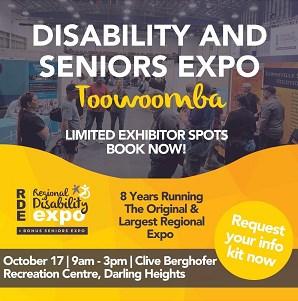
In Australia, a person may be placed under guardianship or administration orders if they require help with decisionmaking.
An appointed guardian then has legal authority to make decisions or support decision-making on behalf of an individual about personal and lifestyle matters specified in an order. An administrator is someone granted authority over financial and property matters.
In Victoria, the so-called gag law refers to clause 37 in schedule 1 of the Victorian Civil and Administrative Tribunal (VCAT) Act 1998, which states that, "unless the Tribunal orders otherwise", a person must not publish or broadcast in-

formation that could identify parties involved in guardianship and administration proceedings.
The tribunal may make an order, "only if it considers it would be in the public interest to do so".
This provision can effectively stop people from talking publicly about any of their experiences of guardianship or administration orders. This can also extend to VCAT proceedings, according to a spotlight paper published by the Victorian Law Reform Commission (VLRC) in February.
In a letter to Victorian MPs, the state's peak advocacy organisation for adults with intellectual disability, VALID, said the "unnecessary restriction" is applied automatically and "assumes the need to protect people with disabilities". "Their will and preference is not taken into account," the letter reads. "It contradicts human rights principles, undermines transparency and public trust and curtails free speech."
Gray-Barberio said the current legislation has a "silencing impact" on those under guardianship or administration orders.
"It is so important for them to be able to have choice and control when it comes to their decision-making, to publicly share their lived experience and stories related to their guardianship. I think that is within public interest," she said.
"People living with disability or with chronic health conditions shouldn't have to ask for permission to tell their own story and lived experience."
Cartwright, 30, is an advocate who lives with disability. He came up against the gag law several years ago when a documentary about his life became subject to it.
Life is a Battlefield was acquired by SBS and broadcast in December 2021 as part of the International Day of People with Disability, after which it was available online via SBS' streaming service On Demand.
Two weeks after it screened, VCAT raised concerns relating to Cartwright having identified himself as someone previously under the control of the State Trustees. SBS decided to take the program down to allow legal concerns to be addressed.
Cartwright applied to VCAT for a declaration that clause 37 did not apply in his case, with a tribunal deputy president making an order allowing the material to be published. This meant the documentary could go back online, and Cartwright could be legally identified.
Cartwright has been advocating for reform in Victoria ever since. Most states and territories in Australia, except the ACT, ban the publication of information about guardianship proceedings in some way, according to the VLRC paper. This varies state by state, with Tasmania introducing
changes last September. Among the recommendations from the Disability Royal Commission was that States and Territories should amend their laws to "repeal provisions prohibiting publication of material identifying a party to the proceedings as the default position".
The Victorian private member's bill, backed by Cartwright, proposes an amendment to clause 37 of the Act, which allows a represented person, or someone authorised by them, to disclose information about their proceedings without requiring tribunal approval. "I think there is a place for it [the gag provision]," Cartwright said.
"I do believe that there needs to be some protections in place to stop abuse and weaponisation of people's stories, whether that's with the media or with family members.
"But the bill says the silence mechanism is not the default. It's an extra step."
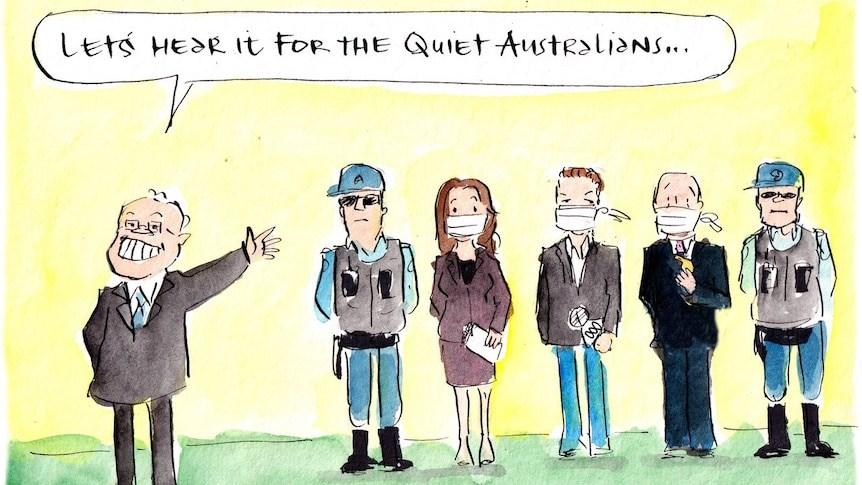
I just wanted to share and also give a caution for people with disability who are using disabled toilets in the community.
Most of the toilets that I use around my local area and also in the city are clean and quite easy to use. I have spoken before about issues with baby pulldown change tables that can sometimes be quite dangerous if they are not secured properly - but in the main this issue has been handled effectively by reporting the issues and making sure that I follow up that things have been changed and fixed so safety is a priority for everybody.
However, last week when I was attending a research and community event at the Toowoomba City library, I had a very scary and confronting experience which ended my ability to be able to continue the session and also required me to go home rather immediately!
The Disability toilet on level III at the library is a really good size and has a changing places laydown table and shower and toilet. It is very easy to access and really creates an environment that enables people with disability to utilise the community rooms and participate in education very easily.
However when I was attending a session late one night last week me and my carer went to the toilet and pushed on the door to be greeted by screams and threats from inside.
A homeless woman had barricaded herself in that toilets and set it up as a bedroom. She chased after us and I don't know how fast I was going but it was pretty fast!
My carer was very good and directed us away from the area however it meant I could not go to the toilet.
BySharonBoyce
These sort of situations are very scary and it is very limiting to for a person with disability as there is only one toilet there that is available on that level.
I felt we had to go and warn the rest of the people in the workshop and other individuals with disability as well. We went and saw the library employee and talked about security and what we should do.
We left and went home quite quickly and could not attend the rest of the session which was very disappointing.
However, I think I was really upset and scared about what had happened and would not have been able to concentrate and take part in the rest of the night.
These sorts of issues are very confronting and something that we as a community need to be able to consider and discuss to try to create some solutions to the issue.
I was quite empathetic towards the homeless person and I realise there are huge issues across this area. It was a very cold night and I am sure that the Disabled toilet space was warm and inviting.
However, the impact on people with disability who need to use that toilet was massive. There was nowhere else to go, the woman was aggressive and if someone was there by themselves it would have been very risky and there were many other people In the library who did not know she was even in there - as we did not until we attempted to enter!
We need to be aware this happens and try and work out solutions to make this issue better.
Thank you Sharon for sharing this traumatic experience with our readers. Ed
ByCliffordGouldsonLawyers
The Disability Discrimination Act 1992 (DDA) is currently under review with the aim of modernising it to better protect people with disability and align with recommendations from the Disability Royal Commission.
This review will consider options to implement the 15 recommendations from the Royal Commission and also address broader issues to improve the experiences of people with disability. The review is a response to calls for the DDA to be updated to reflect contemporary expectations and address its outdated nature.
• Shifting from a reactive approach (responding to complaints) to a proactive one, requiring organizations to actively prevent discrimination.
• Strengthening the enforcement mechanisms and making it easier to address violations.
• Simplifying the process for individuals to prove discrimination.
• Reviewing the concept of "indirect discrimination" and how it applies in various contexts.
The Australian government has committed $6.9 million to the review and is leading the process. Consultation is underway, including an Issues Paper and community survey. The review will draw on previous reports and submissions from the disability community, including the Disability Royal Commission and the Attorney-General's Department is leading the review.
The DDA is seen as outdated and overly legalistic by many in the disability community.
Proving discrimination under the current framework is complex, costly, and often difficult for individuals.
The Disability Royal Commission made significant recommendations for strengthening the DDA and community expectations have evolved, and the DDA needs to reflect these changes.
In addition to the federal review, Queensland is also undertaking reforms to its Anti-Discrimination Act, which includes provisions related to disability discrimination. The Queensland reforms, initially scheduled for July 1, 2025, have been paused for further consultation.
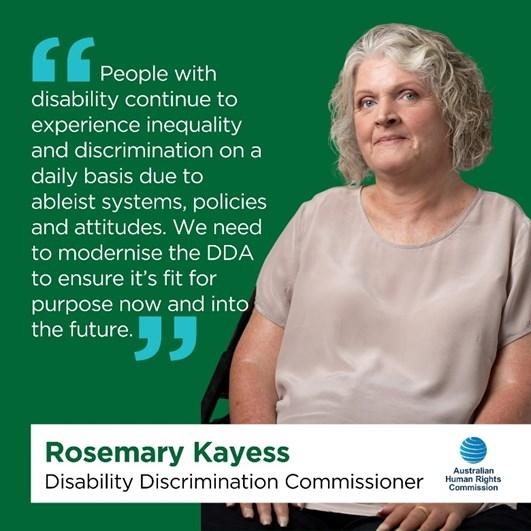
Ready-made NDIS businesses are being flogged for as little as $45,000 on Facebook Marketplace and Gumtree – spruiked as a way to make mega profits. A cottage industry has also developed to help beat the troubled system’s audit process with whistleblowers revealing that some auditors are being paid to give passes to businesses.
ByCharlotteKarpandJulieCross
anything. If you are interested, you can buy it”.
Just 14,000 out of the more than 190,000 providers in the NDIS are registered, so buyers of a Gumtree cleanskin business get a veneer of superior credibility.
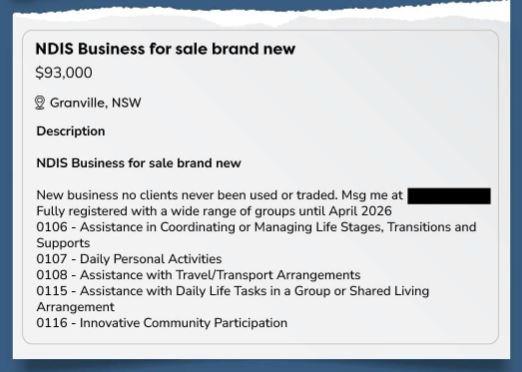
Scores of NDIS companies are being peddled as turnkey-ready with no black marks, no bad reviews. They are sold with registrations, documentation and regulatory requirements to start trading immediately.
Just 1 seller of the 10 contacted by the Herald Sun was concerned about whether or not a buyer had any experience in disability services.
Questioned about background checks, one private seller hawking his cleanskin business for $100,000 said “I don’t need
They also have access to an extra slice of the market: the 30% of NDIS participants whose packages are managed by the NDIA.
Additionally, registration puts the buyer of a cleanskin business on the path to providing some of the most expensive scheme offerings, such as specialist disability accommodation.
Insiders say that if buyers cut corners and run the business incorrectly prior to the initial audit after 18 months of operating, they can either engage a consultant to ensure they pass or find an auditor willing to give a false clean bill of health.
However, the amount of money available in the NDIS – $52bn a year and rising – has also attracted some unethical operators.
Buying a pre-registered business is a way for NDIS providers to dodge lodging hundreds of documents to the government and the standard waiting 18 months for approval.
Anyone looking to buy an NDIS cleanskin company does not need any qualifications or experience.
Last Monday, there were 22 cleanskin NDIS businesses for sale on Facebook Marketplace in the Sydney region, an additional 15 in Melbourne, and three each in Adelaide and Brisbane. A further 43 businesses were up for sale Australia -wide on Gumtree.
And according to a number of these online ads, the more disabled the client, the higher the profit margin.
One Sydney-based seller said: “If you’ve got a client with a $200,000 plan, you’re making about $60,000 to $70,000 per

client.
“If you’ve got a $2m client, you’re making a lot more. [The profit margin] depends how many services you are providing.”
National Disability Services CEO Michael Perusco said quality providers usually make negative margins.
But that doesn’t stop some brokers and private sellers from boasting NDIS registrations to care for the “highest-paid groups”. These comprise severely disabled clients with large plans that include lodging allowances, such as specialised disability accommodation and supported independent living.
Of the 10 inquiries to social media sellers, only 1 emphasised the importance of providing quality care to disabled people, and no one asked who the prospective buyer was or whether they had any experience in the disability sector.
And while auditing should safeguard against bad behaviour, some businesses hire consultants to ensure they pass the audit, while others get a clean report from auditors who for a fee are willing to turn a blind eye.
Angela Harvey, a former NDIS auditor who now works as a consultant helping providers improve services, said some consultants offer pass guarantees.
In some cases they will rewrite policies, add dummy information, create a folder for the auditor with perfect documentation, and offer a cheat sheet of likely questions and appropriate answers.
Ms Harvey said some auditors allow the provider to pick which participants are part of the official assessment.
“The practice standards are that loose and paper based that it’s not hard to offer a 100% guarantee,” she said.
Even if a provider does get caught in the audit process, there’s nothing to stop them from buying a new cleanskin company and starting all over again.
ByCliffordGouldsonLawyers
The Property Law Act 2023 (Qld) (Act) and the Property Law Regulation 2023 (Qld) commence today, 1 August 2025 and introduce the most significant changes to property law in Queensland in over 50 years. A new seller disclosure regime is being introduced along with changes to the laws governing leasing, deeds, easements and many other areas.
The seller disclosure regime applies to the sale of all land (commercial, rural and residential) unless one of the very limited exemptions applies.
The Disclosure Statement must:
• be in the approved form;
• include the detailed information prescribed by the regulations;
• be completed with the information that is true at the time the statement is given to the buyer; and
• be signed by the seller (or their agent)
The seller must also provide to the buyer, particular documents required by the Regulation (called prescribed certificates) that are applicable to the property.
The Disclosure Statement and each prescribed certificate must be provided to the buyer before the buyer signs the Contract. Although it is not a requirement of the Act, we recommend that the seller request that the buyer sign and return a copy of the Disclosure Statement to clearly evidence that they received it.
The buyer may terminate the Contract at any time before settlement, if the seller either fails to give the buyer a Disclosure Statement or a prescribed certificate before the Contract is signed by the buyer or, having given a Disclosure Statement and the prescribed certificates before the buyer signed the Contract, all of the following apply:
• the Disclosure Statement or a prescribed certificate is inaccurate or incomplete at the time it is given to the buyer; and
• (b) at the time the Contract is signed by the buyer, the buyer is not aware of the true state of affairs; and
• (c) if the buyer had been aware of the true state of affairs, the buyer would not have signed the Contract.
We caution sellers that it will take time to prepare the Disclosure Statement, so we recommend that sellers prepare their Disclosure Statement before listing their property, so it is ready to go as soon as a buyer is identified.
If you intend to sell your property in the near future, or if you have any questions, please contact our Property and Business Transactions Team.
Clifford Gouldson Lawyers is a leading regional provider of legal services to the business, government and not for profit sectors. Established in Toowoomba more than 10 years ago with a commitment to offering specialised expertise in a regional setting we now provide our services across multiple offices including Toowoomba, Brisbane and the Sunshine Coast.
ByMichaelBurge
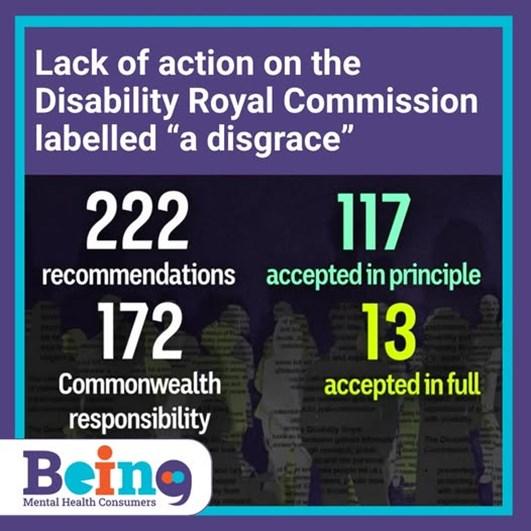
It's been a year since the Royal Commission into Violence, Abuse, Neglect and Exploitation of People with Disability was published and advocates are concerned about how little has been implemented.
Of the 222 recommendations, 172 are the responsibility of the federal government. But of them, only 13 have been accepted in full with another 117 accepted in principle. Advocates and the disability community are disappointed at the lack of action with Senator Jordan Steele -John calling it "an insult to the disability community."
BEING's CEO Giancarlo de Vera was one of those who gave evidence to the commission and says,
"I understand why the disability community are feeling like the Royal Commission isn't living up to its promise. While so many of the 222 recommendations require further consideration, many of the mental health recommendations, were clear especially prohibiting restrictive practices in mental health and health settings."
"I urge the biannual reporting against the recommendations be released urgently, so the evidence so many other disabled people gave isn't for nothing."
"The adoption of a Human Rights Act for NSW would go along way in ensuring the human rights abuses the Disability Royal Commission uncovered never occur again".
ByHelloCareEditorial
The Australian Skills Quality Authority (ASQA) has moved to cancel over 3500 qualifications in aged care, disability support, mental health, childcare, and community services issued by Arizona College Pty Ltd.
This action follows a compliance investigation that uncovered an alleged cashfor-diplomas scheme, raising serious concerns about the integrity of vocational education and training (VET) in Australia.
The investigation found that Arizona College, based in Docklands, Melbourne, failed to meet registration conditions, including financial viability requirements. It was also determined that the college issued qualifications without adequate
assessment and did not ensure students had met all necessary requirements before receiving their certificates or diplomas.
These qualifications, issued between January 2024 and June 2025, include Certificate IVs in disability, ageing support, mental health, and child, youth, and family intervention. Graduates with these credentials were eligible to work with some of Australia’s most vulnerable people, such as in disability support, residential care, rehabilitation centres, and outreach programs.
ASQA notified 3569 affected graduates of its intent to cancel 3717 qualifications and statements of attainment. Students were given until mid-July 2025 to provide evidence that they had received the
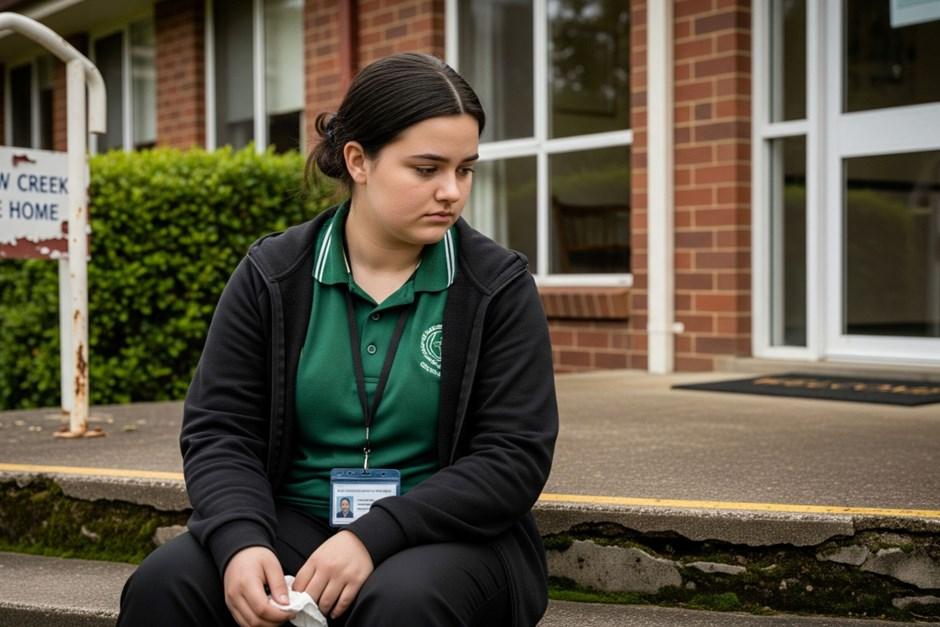
necessary training and assessment to validate their qualifications. However, the regulator has since proceeded with the cancellations, citing significant issues that pose potential safety risks to individuals, workplaces, and vulnerable community members.
This is not an isolated incident. In June 2025, ASQA revoked over 4200 credentials from SPES Education Pty Ltd for similar reasons, including Certificates III and IV in individual support, ageing support, and disability support. Additionally, the registration of Christa College Pty Ltd, which offered early childhood education qualifications, was cancelled in July 2025.
These cancellations are part of a broader crackdown on fraudulent practices in the VET sector. Since November 2024, ASQA has cancelled more than 25,500 qualifications held by over 23,000 individuals, reflecting ongoing efforts to restore confidence in the system.
The federal government has supported these efforts, allocating $37.8 million in 2023 to improve VET provision, with over $30 million directed to ASQA. This funding enabled the establishment of an Integrity Unit and a tip-off line to combat fraudulent behaviour.
ASQA’s investigations and enforcement team is currently managing 189 serious matters involving 154 providers, with 74% of cases related to alleged fraud, such as bogus qualifications, fabricated assessments, and funding fraud.
The cancellations come at a challenging time for the aged care and disability sectors, which are already grappling with workforce shortages. The loss of thousands of qualified workers is likely to exacerbate these pressures, raising concerns about the impact on service delivery for vulnerable Australians.
ASQA has emphasised that maintaining the integrity of the VET system is critical and will continue to work across government to prevent and disrupt nongenuine providers.

Disability parking permits are now free for eligible Queenslanders.
That’s $19.75 back into the pocket of Queenslanders who no longer have to pay for a disability parking permit.
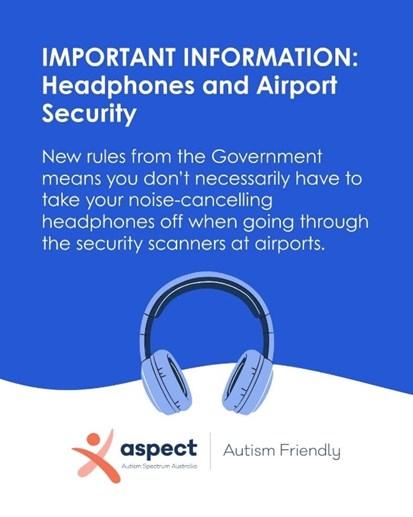
Recent changes in Australia allow individuals to keep their noise-cancelling headphones on during airport security screening in some situations. This change is particularly helpful for autistic individuals and others with hidden disabilities who may find the security process overwhelming.
Some airports in Australia have implemented changes allowing passengers to wear noise-cancelling headphones through security screening.
This change is a significant step toward making air travel more accessible and inclusive for autistic individuals and those with other hidden disabilities.
While you can keep your headphones on, screening officers may still ask to screen your headphones or conduct secondary screening, such as swabbing for explosives or a physical search of the item.
According to the Department of Home Affairs, a screening officer can still ask you to remove the headphones for inspection, but they cannot force you to do so. If they deem it necessary, they may not clear you through security without removing them.
If you have a medical device or equipment, the screening officer should not attempt to remove or interfere with it.
It's important to communicate with the screening officer about your needs and any specific requirements.
The NDIS Quality and Safeguards Commission have just launched Restrictive Practices and Me, a collection of resources that support meaningful conversations with participants about restrictive practices.
The resources include discussion books in Easy Read and Plain English formats. They can be used to explain restrictive practices in an easy-to-understand way. Restrictive Practices and Me was created in collaboration with people with disability, providers, state and territory governments, and the Council for Intellectual Disability.
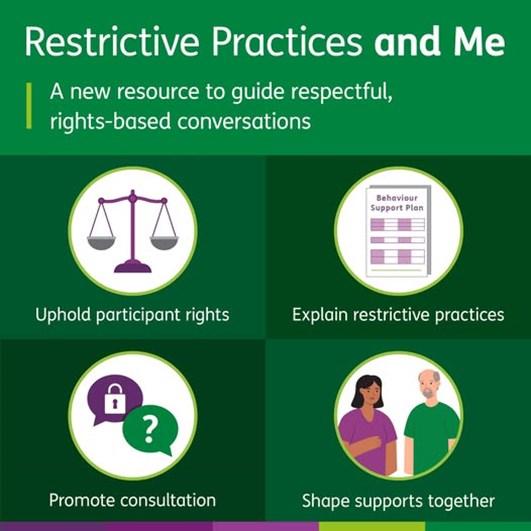
This guide explains what a restrictive practice is, and sets out information on the five types of regulated restrictive practices, being: chemical restraint • environmental restraint • mechanical restraint • physical restraint • seclusion.

A prominent disability justice activist will soon appear on quarters (25 cents) issued by the U.S. Mint as part of a special program honouring notable American women.
Coins featuring Stacey Park Milbern were available from 12 August 2025
The U.S. Mint describes Milbern, who had congenital muscular dystrophy and died in 2020 at age 33, as a “visionary leader and powerful activist for people with disabilities.” Milbern was instrumental in pushing for a North Carolina law mandating a disability curriculum in schools and served on the state’s Independent Living Council and Commission for the Blind as well as the President’s Committee for People with Intellectual Disabilities at the federal level. She was also known for advocating for those from marginalized communities and spoke out about disability discrimination in health care.
The quarter, which features the words “disability justice,” shows Milbern speaking to an audience while seated in a power wheelchair. She has one hand
near her trach and her other with the palm facing up in a gesture that the U.S. Mint said is meant to promote the exchange of ideas and allyship. The coin was designed by Elana Hagler, an assistant professor of art at Alabama State University.
Like other quarters, a portrait of George Washington appears on the reverse side. The new coin is part of the U.S. Mint’s American Women Quarters Program, a four-year effort that began in 2022 to honour 20 remarkable women.
More than 11,000 suggestions were submitted for the program during a public comment period. The U.S. Mint worked with experts from the Smithsonian Institution and the National Women’s History Museum to select honourees for the quarter series.
Quarters released through the program have featured civil rights activist Ida B. Wells, First Lady Eleanor Roosevelt, astronaut Sally Ride, writer Maya Angelou and Juliette Gordon Low, who founded the Girl Scouts of America, among others.
“It’s a privilege for the Mint to connect America through coins, and to tell our nation’s story through honouring the women in this amazing program,” U.S. Mint Director Ventris C. Gibson said when the 2025 selections were initially announced. “The pioneering women we have recognized are among the many in our nation’s history who have made significant contributions and championed change in their own unique way.”

The BigDog Day Service is back – and wow, have we been busy!
This past month has been full of fun, laughter, and unforgettable adventures. We kicked things off with a trip to Gatton, where we enjoyed some classic comfort food at Grumpy’s Diner – talk about a delicious blast from the past! Then we picked up the pace at iPlay, where we got our hearts racing with some fast-paced driving action. It was high-energy and full of excitement!
We’ve also been celebrating in style with a few special birthdays and our cozy PJ Day - because who doesn’t love a day in their favourite pyjamas?

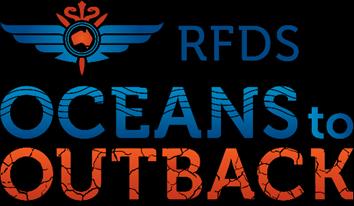
ByStevenPaull

I'm fundraising for Royal Flying Doctor Service (RFDS).
Australia is a big country, and for those living in rural and remote areas, access to immediate care isn’t a guarantee. For some communities, the nearest hospital is eight hours drive away.
My father was a Flying Doctor pilot during the 1950s and 1960s, and as a child, I lived in Cloncurry Queensland and Darwin Northern Territory. I'm proud of his work and that of other pilots, doctors and nurses in providing this valuable service to outback Australians.
This October, I’m taking on a monthlong fitness challenge to help more people access the care they need. By going further, I hope to raise as much as possible for the RFDS.
Every year, the RFDS reach more than 330,000 Australians with 24-hour emergency retrieval and primary healthcare services. That’s one person every two minutes!
Together, we can keep the Flying Doctor flying and continue their life-saving work. Please donate to my challenge today!

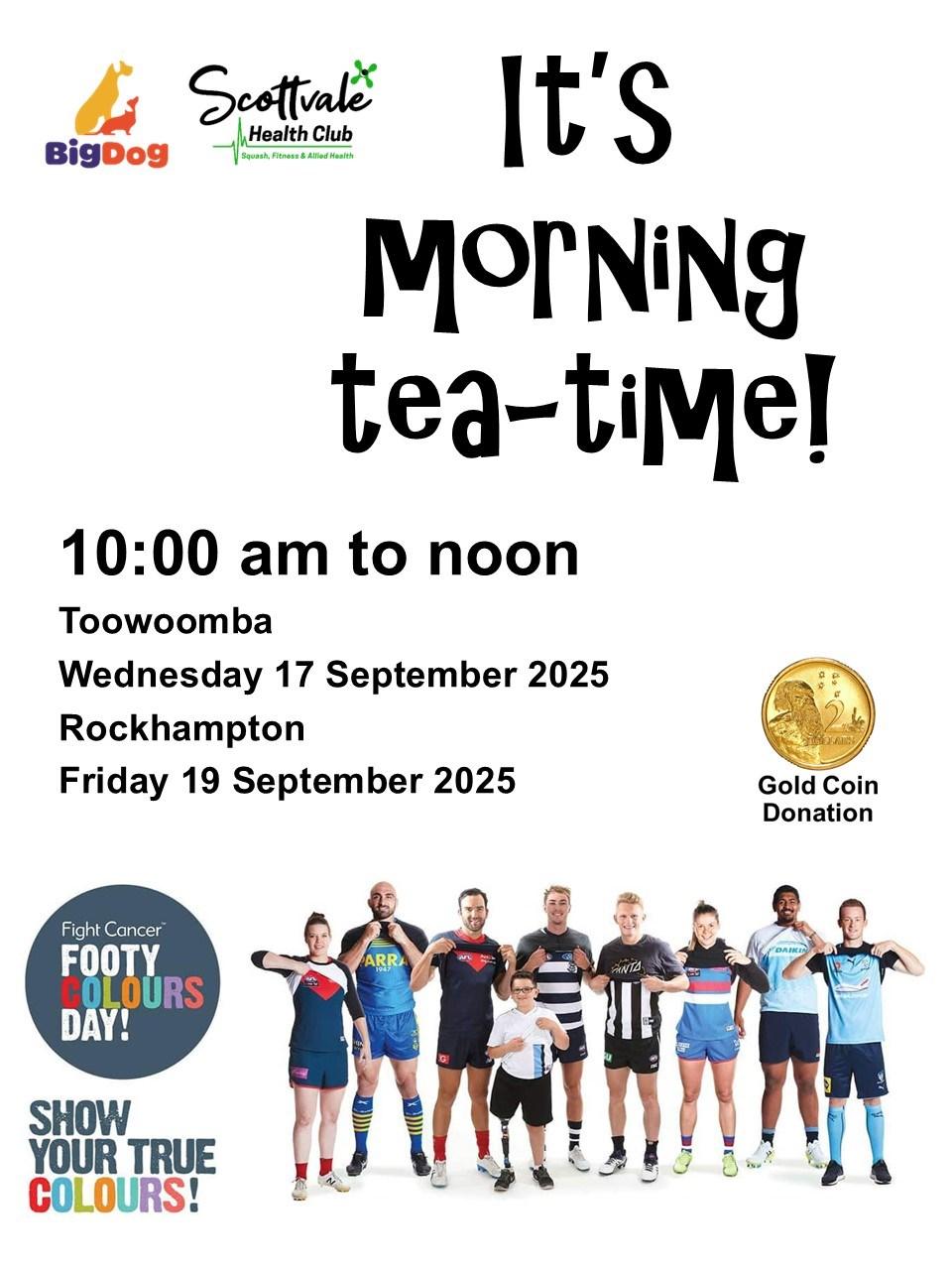




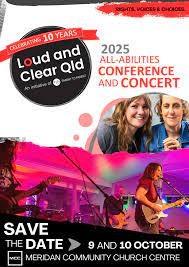
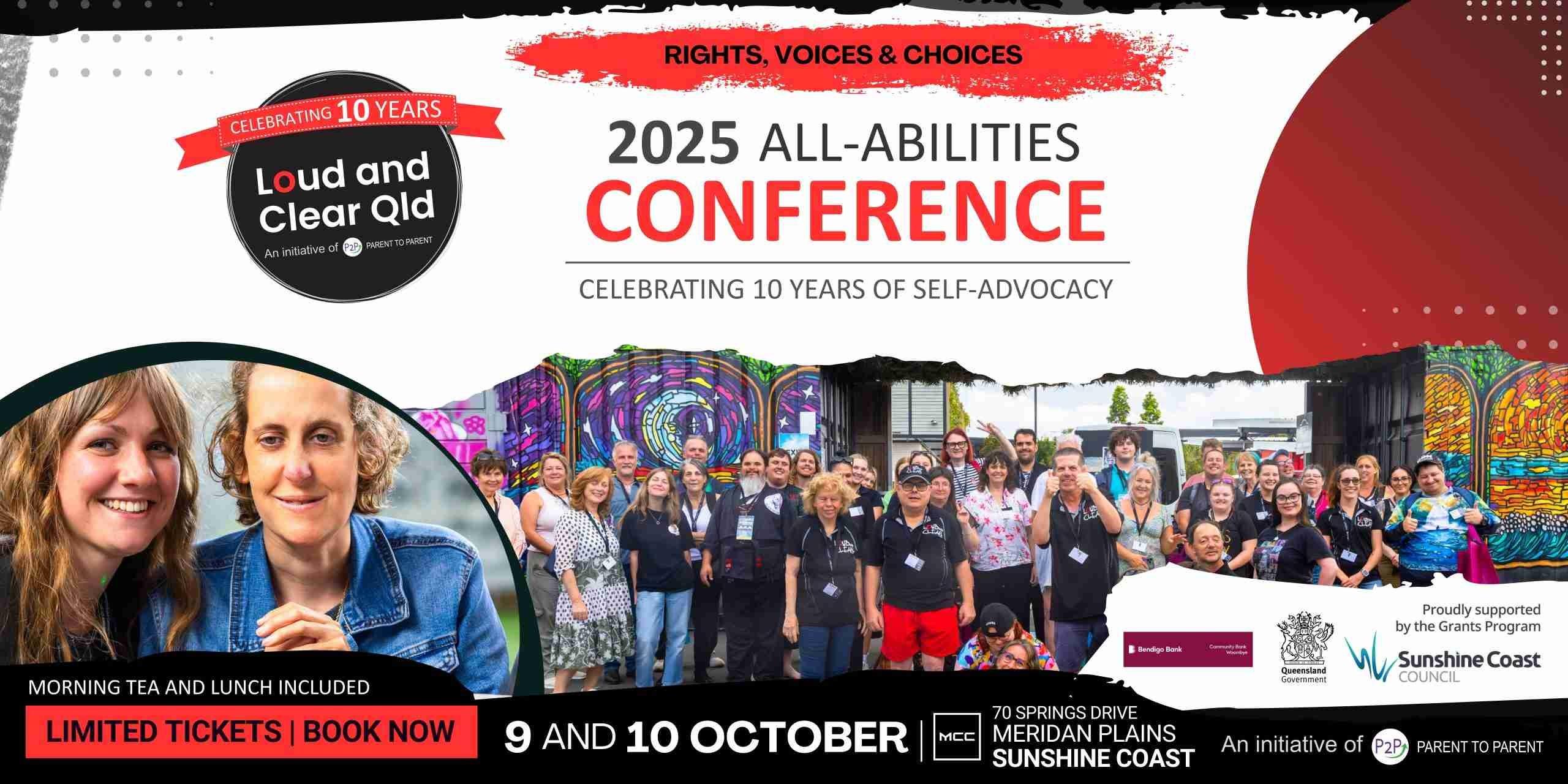

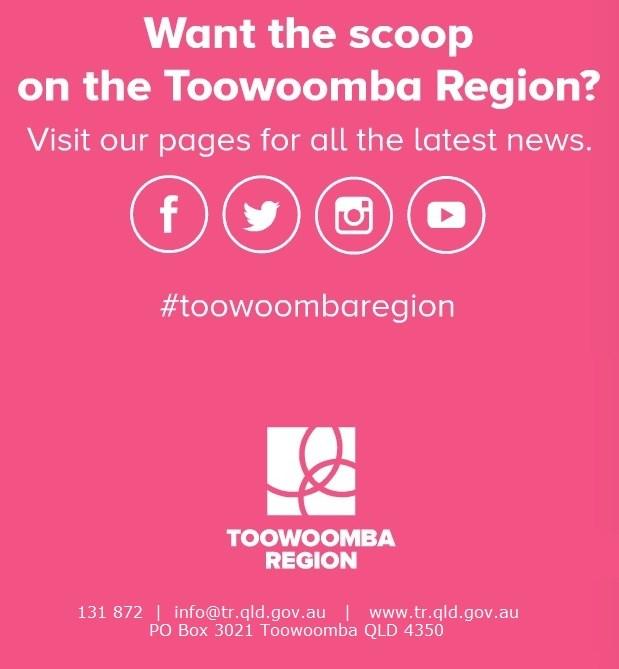
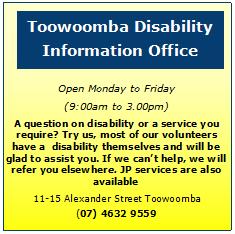



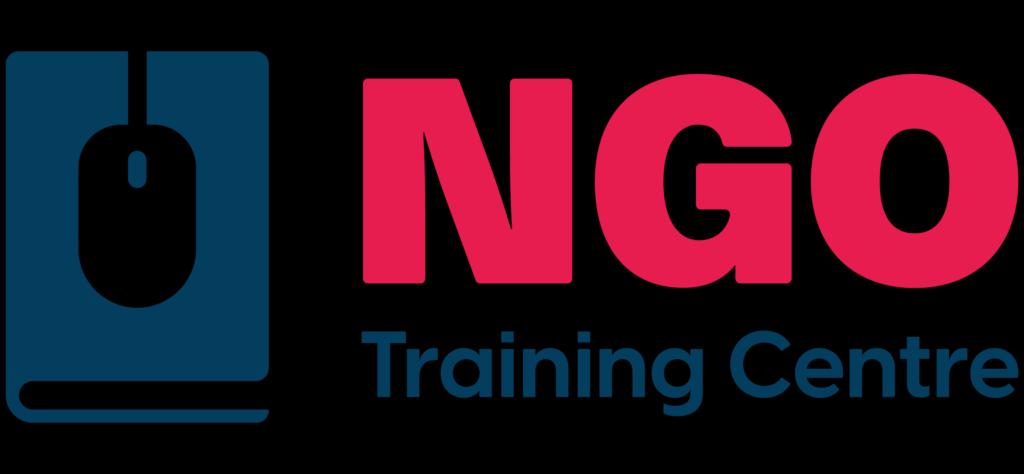



STEVEN
PAULL President
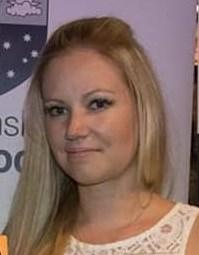
COURTNEY CARROLL Editor

JESS WRIGHT
Secretary

ANN PAULL Treasurer
PUBLISHER: Disability Media Association Inc (Australia)
TELEPHONE: (07) 4632 9559
OFFICE: Paul Myatt Community Centre 11-15 Alexander Street Toowoomba (open Monday to Friday 9:00am-3:00 pm)
E-MAIL: steven@bigdog.au
MANAGEMENT BOARD: Steven Paull (President) Courtney Carroll (Editor) Jess Wright (Secretary) Ann Paull (Treasurer)
CONTRIBUTORS: Bronwyn Herbertson, Sharon Boyce, Aidan Wilcock, Dean Gill, Jess Wright, Steven Paull and many others.
PUBLISHED
January/March/May/July/September/November
ABN: 72 821 350 911
PRINT POST APPROVED: PP 424022/ 1811

Articles and adverts reproduced on these pages are accepted and published in good faith. It is a condition of acceptance that advertisers and article writers accept full responsibility for their advertisements and articles, and will fully indemnify the producers in the event of any claims or legal proceedings against them. Articles published are not necessarily the view of the publishers. Advertisements are also accepted on the basis that they do not conflict with any discrimination laws or other laws currently in force.
Although we are a volunteer and non profit organisation, we are not funded in any way, and have to cover costs of this publication by charging for advertising. WhatsUp reserves the right to adjust, resize or move advertisements when necessary to allow for editing
1) SUBSCRIPTION (In advance) $25 per year (includes delivery/postage).
2) A single edition of WhatsUp can be bought at the office and selected outlets. You may also subscribe by using the form on the outside cover.
3) Reference copies are held in the Tourist Office and Toowoomba Library.
COPYRIGHT
Copyright Protected. All pages are subject to copyright law and may be copied only with the permission of WhatsUp. Copies are not to be used commercially or for profit or for personal financial gain. Permission may be granted to copy only if the purpose is to give it away to others for their personal interest but not to any other organisation or service.
All articles are accepted in good faith and are not necessarily the view of the Editorial team or Management. Articles are accepted on the understanding that in the event of any claims against WhatsUp, the writer of the article will take full responsibility and indemnify WhatsUp in the event of legislation against it. Articles are also accepted on the understanding that the contents do not breach any Disability laws or other legislation currently in use.
WhatsUp In Disability is provided as a Master Copy to individuals and organisations or to view online form our website. We are environmental friendly, we do not print any more copies than is absolutely necessary. We prefer and encourage the practice of passing the magazine from person to person or copying the whole magazine to pass on to others. Permission is needed to copy (see Copyright above) When copying the magazine we require that the pages be marked ‘copy’.
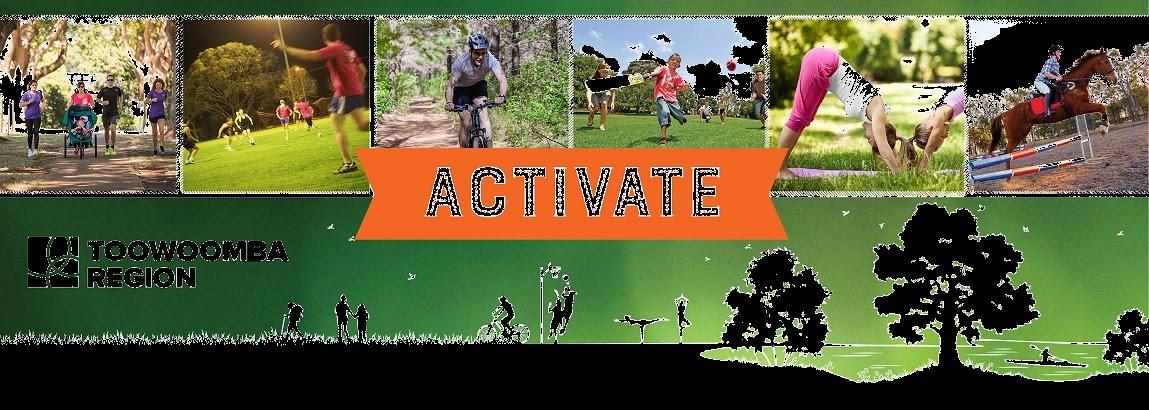
Australian Governor-General Her Excellency Sam Mostyn AC has paid a special visit to Singapore’s Gardens by the Bay where she unveiled a plaque marking the permanency of Toowoomba’s Genestreaming Journey sculpture in the Outdoor Gardens of the world-renowned attraction.
The three metre-tall Genestreaming Journey Sculpture is a gift from Toowoomba to Gardens by the Bay and was part of Toowoomba Carnival of Flowers’ floral display at the Flower Dome from September to November 2024.
Toowoomba Region Mayor Geoff McDonald said it was a terrific outcome to have a permanent display promoting the Toowoomba Region at one of the world’s premier tourist attractions.
“I’m delighted that Governor-General Mostyn was on hand in Singapore to unveil a plaque marking the permanency of the Genestreaming Journey sculpture which was part of our Carnival of Flowers display in the Flower Dome last year.
“People from all over the world passed through our unique Australia-themed display last year and now the Genestreaming Sculpture will become a permanent reminder of Toowoomba’s special relationship with Gardens by the Bay and more broadly Australia’s special relationship with Singapore,” Mayor McDonald said.
The Genestreaming Journey sculpture is a giant evolutionary tree highlighting deep time connections between species over millions of years. Shaped like a budding flower, it features First Nations art on the inside and naturalist art on the outside.
www.whatsupindisability.org
To contribute to the next edition please send your article to steven@bigdog.au
by the 20th February/April/June/August/October/December to reserve your sponsorship or story


WhatsUp In Disability 11-15 Alexander St Toowoomba QLD 4350 Phone: (07) 4632 9559
Email: steven@bigdog.au
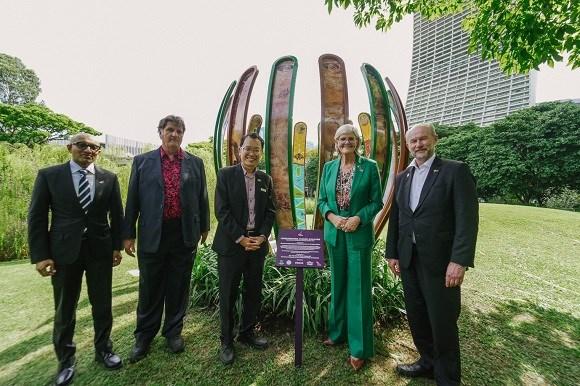
Australian Governor-General Her Excellency Sam Mostyn AC unveiled a plaque of Toowoomba’s Genestreaming Journey sculpture at the Outdoor Gardens of Singapore’s Gardens by the Bay.
She was accompanied by (from left) Singapore’s High Commissioner to Australia His Excellency Anil Kumar Nayar, Gardens by the Bay’s Principal Horticulturist Anton Steven Van Der Schans, Gardens by the Bay CEO Felix Loh, and Australia’s High Commissioner to Singapore His Excellency Allaster Cox.
WhatsUp In Disability APPLICATION FOR SUBSCRIPTION 2025 ($20 per year including postage)
NAME
ADDRESS Post Code
TELEPHONE E-MAIL
SUBSCRIPTION $25 MEMBERSHIP $5
SUBSCRIPTION + MEMBERSHIP $30
DIRECT DEBIT: BSB: 638 070 ACC: 1071 4219
“Please make cheques payable to Disability Media Association Inc. (Australia)”
Please cut out / scan and post to:
11-15 Alexander St, Toowoomba 4350 with your cheque